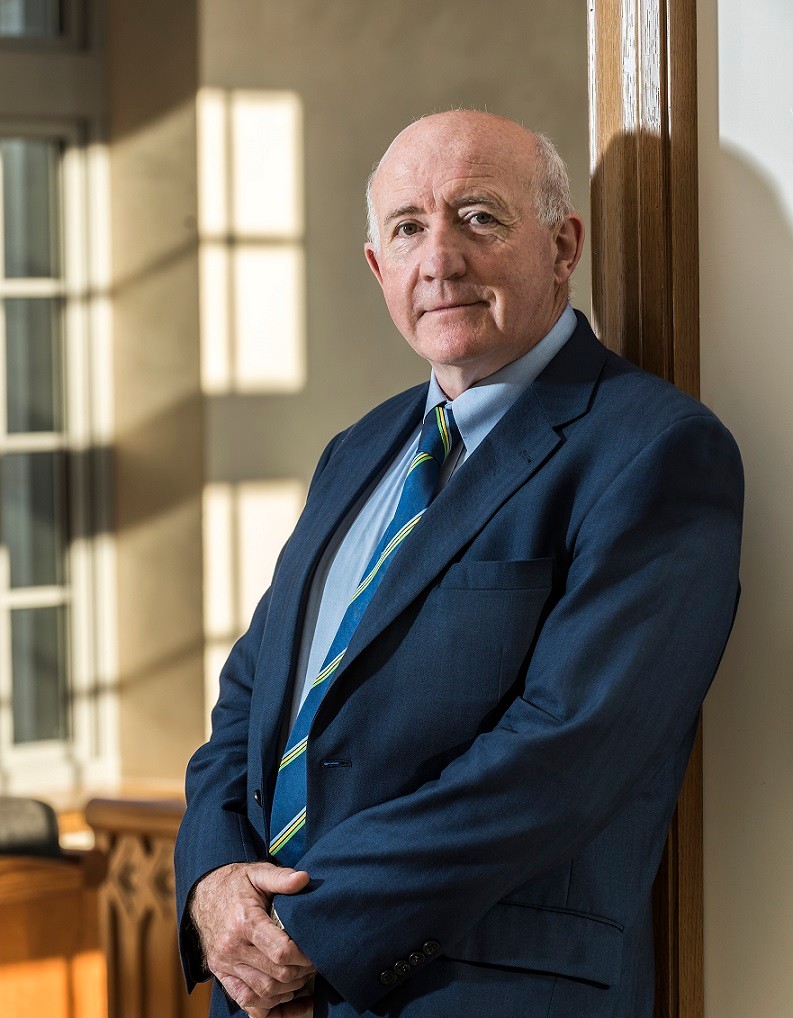Boston College’s philosophy program is 13th in the United States and 41st in the world, according to the recently released QS World University Rankings by Subject.
Prepared by British firm Quacquarelli Symonds, QS surveys are considered to be among the most influential providers of international university rankings. QS studied the academic reputation, employer reputation, and research impact of more than 13,000 individual university programs to come up with this year’s rankings of 48 academic disciplines.

Joseph Professor of Catholic Philosophy Dermot Moran, chair of the Philosophy Department. (Photo by Lee Pellegrini)
The QS citation for Boston College noted its faculty/student ratio of 13:1, a “very high” research output, and an impressive number of citations per faculty member, among other highlights.
“I’ve always thought that we were a premier department, so I’m glad that we’ve been recognized as such,” said Joseph Professor of Catholic Philosophy Dermot Moran, chair of the Philosophy Department. “I’m very proud of the Philosophy Department—I think we are doing exceptionally well.”
This academic year, there are 265 philosophy majors at BC, up from 174 in 2018. Philosophy is now the University’s fourth most popular minor, with 198 enrolled. The department includes 36 full-time and 28 part-time faculty members, as well as 37 active doctoral students and 54 master’s degree students.
Associate Professor of Philosophy Giovanni Pietro Basile believes that an appreciation for philosophy “is something that belongs to the spirit of Jesuit institutions. We care about these questions.”
Boston College, which according to the National Center for Education Statistics (NCES) produced the fifth-most philosophy majors of any university nationally over the past decade, is something of an anomaly in its continued prioritization of philosophy and the humanities more broadly. Sixty-six percent of American universities don’t offer philosophy as a major, according to the NCES. This lack of opportunities elsewhere, combined with philosophy’s reputation at BC, has made the University a hotspot for those pursuing careers in the field.
“We had 191 applications for our Ph.D. program this year, and we can choose only five people,” said Basile. “They are all asking to study with us because they can only find what they are looking for at Boston College.”
BC takes a decidedly more multidisciplinary approach to philosophy, according to students and faculty. More than half of the philosophy majors at BC are doubling or tripling with another area of study, for example, and faculty members Patrick Byrne and David Storey traveled to last fall’s COP26 United Nations Climate Change Conference in Glasgow to present a humanities-based argument for curbing climate change.
“There is a great deal of diversity in the disciplines to which people are drawn. So, they’re doing philosophy plus economics, or philosophy plus English, or philosophy plus another major,” Moran explained. “And that’s very good, because it enriches our subject, and it also enriches other subjects, as students are able to bring their philosophy acumen with them into every classroom that they’re in.”
“When I started at BC, I had a budding interest in philosophy, but as an accounting major in the Carroll School of Management, I never believed I’d take more than the philosophy requirements all BC students need to take,” said Nick Arozarena, a Carroll School senior double-majoring in philosophy, and editor of Boston College’s undergraduate philosophy journal, Dianoia.
“After having a transformative experience in my freshman year philosophy classes, I was convinced that I should pursue philosophy as a dedicated academic pursuit.”
Lubens Benjamin, a Carroll School junior minoring in philosophy, came to the program through a similar path. “My interest in philosophy was one that I didn’t know I had until coming to Boston College. I found myself fascinated after every class.”
Among those with bachelor’s degrees, the median earnings of philosophy majors exceed those of majors in any other humanities field, according to The Wall Street Journal. A 2014 analysis of data from the Law School Admissions Council by University of Iowa College of Law Professor Derek Muller found that philosophy majors are also the most successful law school applicants among all majors.
“One of the things I often do when students come in to declare a major or minor is ask them: ‘What made you decide to do this?’” said Paula Perry, administrative and undergraduate program assistant for the Philosophy Department. “And it’s always based on a particular class or a particular professor who got them interested in a specific topic, and that’s really nice to see.
“We try to make sure that students know that there are lots of places you can go with a philosophy degree,” she added. “A lot of our students go on to law school or medical school—it’s a good background for a lot of different career paths.”
Lucas Carroll '22 / Morrissey College of Arts and Sciences | March 2022




